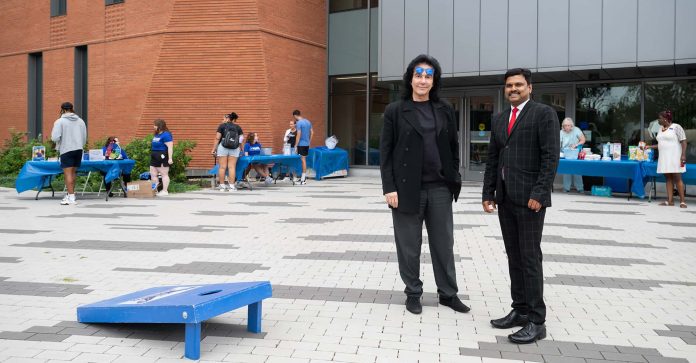On the heels of a successful global business competition last spring, the School of Business (SCOB) is riding a wave of inspiration to bring more high-impact practices to business students. The goal is to transform learning through opportunities that deliver unique engagement in a collaborative, culturally diverse experience.
The global competition created teams from more than 134 student participants representing 18 schools in 11 countries. Five students from Southern joined the multicultural teams that included Eastern Asian, Southern Asian, and American students. Embracing diversity was a powerful component.
“Cultural immersion is really important. Students who are globally aware demonstrate tolerance. It is critical to being successful in the world,” said Business School Dean Jess Boronico, the architect of the high-impact practices plan.
“This is not your typical internship or faculty-mentored study. This is a high-impact practice, making a difference in the students and their enlightenment, and a difference to the companies they’re helping,” Boronico said.
The program is the common thread of Boronico’s career work: to instill in students the understanding that their work can be a game changer.
Professor of Operations Management Birasnav Mutharaj coordinated the competition and shares Boronico’s vision for creating educational opportunities that can have a positive effect on society. The two previously worked together at the New York Institute of Technology, where they executed similar experiential learning events.
Southern’s School of Business competition kicked off in September 2023 and was six months in the planning. Boronico and Mutharaj invited faculty and staff members to suggest global businesses for the competition.
Mutharaj and a team of professors selected three businesses. They interviewed the businesses to write case studies for the students to examine. They allotted $4,500 per case study and assigned a business to each team. Students engaged in open-ended interviewing to inform their analysis of the challenges facing their designated business.
One Connecticut company presented a solar challenge. The company wanted to expand into international markets and sought recommendations on how to move forward.
An electronics company based in California explained an operations-related challenge. It was seeking a solution to the cost and organizational issues related to surplus inventory.
A third company, based in Florida, sought help with the human challenges related to employee cell phone use. They wanted to explore mindfulness at work.
Mutharaj divided up the case study writing among himself and two other professors. Then, the team advertised the competition. It attracted more than 200 students. Once the students were assigned to teams, the professors presented the case studies by Zoom, giving the student teams one month to analyze the cases.
“This was experiential based, using real problems. There’s accountability, as the teams have to report to the companies, who evaluate their work,” Boronico said.
The premise behind experiential learning is the chance to give students an indelible memory to fuel their career aspirations and goals, Mutharaj said. Students interact with practitioners, and the experience makes an impression. That can last a lifetime.
“In high school, teachers may have taken you for a field trip. Definitely, you’d remember that field trip still. When I was in 12th grade, my teacher took me to Bangalore, India. I still remember that visit,” Mutharaj said. “Why? I experienced it. That’s what it’s all about.”
Another benefit is the value-added experience. Students can include the competition on their resumes and professional networking accounts. This opens a network of business contacts that can lead to job opportunities. Students recognize the value of the experience as a pathway, Mutharaj said.
The Global Business Students Competition is one of several high-impact practices the School of Business has planned. The creative approach is helping to raise the school’s profile.
The Association for Advanced Collegiate Schools of Business (AACSB) recently accredited Southern’s School of Business. Enrollment in the SCOB increased 15% in 2023, and another jump is expected this year, Boronico said. That’s due in part to feedback from graduates who are finding success in their career journeys. The school is also gaining a high reputation among international students, who are applying to the program in greater numbers.
“Students are getting good jobs. It’s not just the new building or the accreditation. Students are seeing that we’re rolling out all this stuff. It’s anecdotal evidence at best, but it’s having an effect on parents and students choosing the business school at Southern,” Boronico said.
The high-impact practices model shows the evolution of higher education as it adapts to changing world needs. Traditional college education is expensive, compared to other alternatives such as micro credential programs or online courses. As higher education changes, Boronico said, technology is opening new ways of acquiring knowledge. That presents a challenge for academia to become nimbler and more responsive.
“We’re moving away from institutions as being providers of knowledge capital. We don’t need professors teaching knowledge anymore,” Boronico said. “Students can find that. Teachers feel threatened by that. The world’s changing and we’re not. This is where this came from for me.”
As web-based learning and generative artificial intelligence gain in popularity, programs like Southern’s high-impact practices deliver engagement with project-based learning.
Mutharaj said the Global Business Competition proved to be more than a contest. Business partners seek collaboration with students to cultivate solutions they can implement. “Once the companies understand that these ideas are really impactful, they want the students’ support again and again,” Mutharaj said.
The SCOB plans to send six students to China for the fall semester. Mutharaj visited China this summer to conduct due diligence to help ensure the safety and security of students who will make the trip.
The School of Business plans to offer the Global Business Competition each spring. The competition is open to all full-time business students. For information on the competition or the School of Business, contact Mutharaj at muthurajb1@southernct.edu or Boronico at boronicoj1@southernct.edu.


